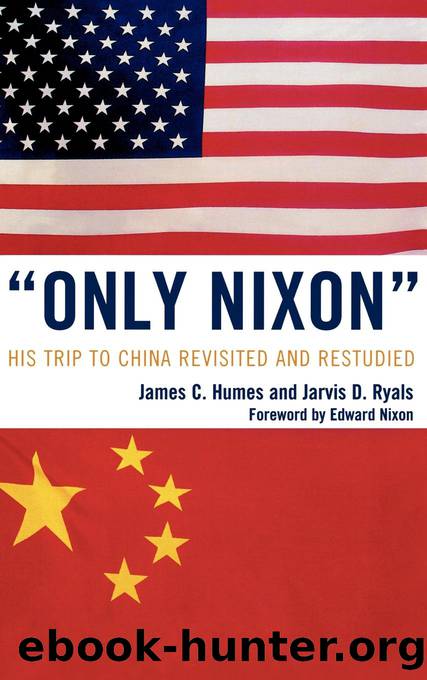'Only Nixon' by Humes James C.;Ryals Jarvis D.; & Jarvis D. Ryals

Author:Humes, James C.;Ryals, Jarvis D.; & Jarvis D. Ryals
Language: eng
Format: epub
Publisher: UPA
Published: 2009-08-15T00:00:00+00:00
NOTES
1. Fairbank, 383-387
2. Ibid., 384
3. Ibid., 401-405
4. Ibid., 371
5. Chaozhu, 182
6. Fairbank, 401
7. videotape
8. Wenqian, 6
9. Ibid.
10. Ibid., 232
11. Ibid., cover
Chapter Six
The Handshake of History
While the Chinese coterie led by âthe Gang of Fourâ plotted to derail any accessibility granted by Chairman Mao and Chou En-lai to the United States, so in America the State Department was stonewalling any initiative by President Nixon to open up a dialogue with the Peopleâs Republic.
Henry Kissinger would jokingly complain to Chou En-lai in 1971 while preparing for the Nixon mission: âOur State Department is pro-Soviet.â In the sense that the Foreign Service careerists were more interested in arranging some sort of détente with the Soviet Union, than with China, it was true. Few old China hands remained in the State Department in the early â70s. Chinese speaking experts such as John Service had left with the taint of being pro-Mao and anti-Chiang Kai-shek.
On the other hand there were many careerists who had served either in the Soviet Union or other Slavic countries in Eastern Europe. Familiarity breeds favoritism, or at least a bias.
Compare the situation with the Middle East when President Truman in 1948, against the advice of the State Department, recognized Israel. The experts on the Middle East were all âArabists,â with knowledge of Arabic and the experience of postings in Cairo, Damascus and other capitals. There were no Zionists in the State Department. (Secretary of State George Marshall would quietly resign in protest to the Truman decision on Israel and Dean Acheson would succeed him.)
Presidents like Truman and Nixon soon realized when they headed the Executive Branch, including the State Department, that it was the career bureaucrats that shape most of the Departmental policy. In most cases, the Cabinet Secretaries are manipulated by the staff over which they preside.
In the State Department âgoing nativeâ means when the Ambassador to a foreign country begins to reflect and recommend the policies of the host country instead of the interests of the United States. In the same way, politically appointed Secretaries become advocates for the policies of the career bureaucrats who serve under them. It is different in corporate America where a new C.E.O. can enforce a change in the attitudes and priorities of personnel.
The State Department under Richard Nixon (Professor Humes served there briefly as a political appointee) consisted of mostly Democrats, at least in their party of registration. Although they were not partisan in their politics, their top political heroâif pressedâmight have been Adlai Stevenson. Their first priority is their career and advancement in the Foreign Service. Because of that, âC.Y.A.â (Cover Your Ass) guides any implementation of policy. That passive approach mitigates against boldness in favor of consensus.
Nixonâs first choice for Secretary of State was Thomas E. Dewey, the twice nominated and twice defeated Republican presidential candidate. Dewey declined and recommended Bill Rogers, the one time Dewey protégé who became Attorney General in the second term of President Eisenhower. Rogers had been a close friend, and perhaps his closest advisor in the 1960 campaign.
Download
This site does not store any files on its server. We only index and link to content provided by other sites. Please contact the content providers to delete copyright contents if any and email us, we'll remove relevant links or contents immediately.
Women and Jewish Marriage Negotiations in Early Modern Italy by Howard Tzvi Adelman(380)
Warrior King by Wilbur Smith(316)
18 real-life stories of serial killers and murderers with solved and unsolved killings from the USA, UK, Europe, and beyond. by Ben Oakley(264)
Who's Who in the Zulu War, 1879: The British by Adrian Greaves Ian Knight(252)
Violence and Emotions in Early Modern Europe by Susan Broomhall;Sarah Finn;(236)
The Battle of Austerlitz by 50minutes(228)
The American Crisis by Unknown(220)
The Seeker by S. G. MacLean(202)
The Dutch East India Company and British East India Company: The History and Legacy of the Worldâs Most Famous Colonial Trade Companies by Charles River Editors(199)
The Origins of French Absolutism, 1598-1661 by Alan James(197)
Invisible Worlds by Peter Marshall(183)
The Traitor of Colditz by Robert Verkaik(182)
A Genius for Confusion by Richard M. Fried(181)
The Slave Trade in Africa by Simon Webb;(177)
Interest and Connection in the Eighteenth Century by Jacob Sider Jost(175)
Fires of Faith by Catholic England under Mary Tudor(175)
The Opium Wars: Exploring the Addiction of Empires from Beginning to End by Ramos Adrian & Compacted History(174)
The Thirty Years War â Complete by Friedrich Schiller(174)
Islam and the Trajectory of Globalization by Louay M. Safi(172)
